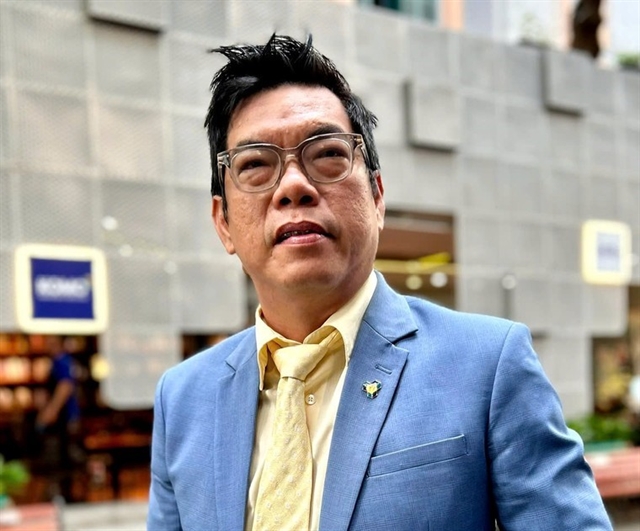
Filmmaker Trần Quốc Sơn. Photo ngaynay.vn
Filmmaker Trần Quốc Sơn has won a Hồ Chí Minh City Literature-Arts Award for his two documentaries entitled Danh Họa Diệp Minh Châu (Painter Diệp Minh Châu) and Suối Nhạc Giữa Đại Ngàn Tây Nguyên (Traditional Music Preservation in the Central Highlands).
Sơn speaks about the award-winning films and how he is able to make documentaries resonate with the audience.
Could you tell us about the documentaries?
Before making Painter Diệp Minh Châu, I went on a field trip and did lots of research about him, discovering that he was not just a successful artist, using themes of President Hồ Chí Minh and the southern region, but Châu is also a recognised sculptor.
Châu has artworks which are in national museums' collections. Being a war-time artist, he was enthusiastically active in the patriotic movements. He followed Vietnamese resistance units to many locations in the south of the country.
We made the film from 2018 to 2022.
The film Suối Nhạc Giữa Đại Ngàn Tây Nguyên was completed in 2018 featuring five Central Highlands provinces of Kon Tum, Gia Lai, Đắc Lắc, Đắc Nông, and Lâm Đồng.
These areas have about 20 ethnic minority groups. Due to the impact of cultural exchange, overlapping residential areas and levels of socio-economic development have created a number of similar cultural features.
However, each ethnic group has its own cultural tradition, in which music is the most clearly expressed, most unique and easily recognisable elements that cannot be separated from the cultural identity of each group.
Recording the musical identity of people in the Central Highlands is talking about a region of civilisation that cannot be divided from its integral culture. Music emerges as a key element, throughout all human activities from birth to death, and it is a dynamic and creative development process of the ethnic groups throughout history.
It must be said that, for a long time, the Central Highlands folk music has been popular and it has been used by musicians to create a number of musical works which are respectfully received by music lovers throughout the country.
So what is it about ?
It is about Kaly Tran, a Ba Na man who is a native of Kon Tum. He embraces the dream of preserving, building and developing the music of the Central Highlands in general, and the traditional music of the Ba Na in particular.
With enthusiasm and passion, he has collected, learned and improved different types of instruments such as gong, t'rưng and others that few people know and play today.
He has also founded the great Kaly Band with nearly a hundred musicians and dancers in order to promote it to the community, particularly to young people, who see the musical identity of the Central Highlands, which is extremely diverse and popular. It is always resounding in the villages and echoing everywhere.
What's the most difficult aspect about making historical documentaries in your opinion?
I think a good film must be alive forever with valuable and cherished information. In my opinion, one of the most difficult things is to approach character. It is necessary to get to know the character and even live with the character to shoot the film.
The objective fact is that today's audiences and their tastes are also different. Therefore, artistic values have also changed. We cannot compare yesterday's values with today's values.
Do you think that documentaries cannot be entertaining?
That's not right. There are still people think that documentary is not easy to attract audiences. But I don't think so. Each artwork is an creativity. If the audience focus on the documentary watching and feeling they will see unique and distinct creativity.
I have learnt a lot from senior film makers. It is inevitable to be affected by them. I always innovate my thinking to have my own creativity. Historical documentary conveys messages and is rich in emotions. How to contribute to reviving the historical atmosphere in the documentary is the job of the filmmakers.
People often call journalists contemporary history writers. Documentary filmmakers are those who recreate history through a contemporary perspective.
Why do you make documentaries?
I make the documentary because it is like my fate. I have been passionate about documentary filmmaking. I have to overcome challenges to have chance making the documentary. At the beginning, I was a little nervous because the senior filmmakers were recognised with awards. I didn't know if I could do it.
Before that, I had tried different works but finally I still chose to make the documentary.
Is it a challenge to popularise historical documentaries?
In the era of the 4.0 technology revolution, the audience's way of accessing information has changed a lot and expanded onto platforms. That also poses many challenges in publicize the historical documentary.
We choose to make the documentary on Vietnamese soldiers and revolutionaries. Discovering new stories and characters are our challenges. Plus, the script writer and director need to truly immerse themselves in the story to make a truthful documentary. VNS